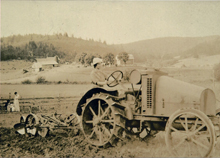The Transformation of Eden
Vera Warren and Emily Dougan's chapter examines how Euro-American settlers conceived of Zena as a land of opportunity and abundance, similar to the Christian paradise of Eden. They believed Zena could be a thriving agricultural community, and they planned to shape the land into what they believed to be more civilized and conducive to their needs and success. The chapter illustrates how such perceptions influenced early Euro-Americans settlers’ sense of place and relationship with the land in Zena and the greater Willamette Valley.
Amanda McClelland and Andrew Spittler explore how the first Euro-American settlers spent their early years growing foods and raising livestock that sustained their livelihood. Although they were not as initially successful as they had hoped, they eventually learned to grow better crops in their new environment and started to expand. Their original perceptions of the land changed and they formed a different sense of place through their success.
Emily Schlieman and Keller Cyra's chapter examines agriculture and technology at the turn of the century at Zena. This chapter investigates the influence of developments in infrastructure and tools--especially tile drainage--on the scale of agriculture in the Willamette Valley, and how these changes might have altered the perception of land at Zena.


